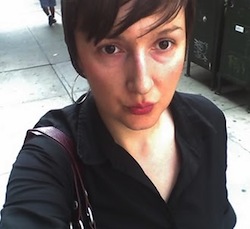
| Jacket 40 — Late 2010 | Jacket 40 Contents | Jacket Homepage | Search Jacket |
This piece is about 5 printed pages long.
It is copyright © Nicole Mauro and Jacket magazine 2010. See our [»»] Copyright notice.
The Internet address of this page is http://jacketmagazine.com/40/r-bozicevic-rb-mauro.shtml
Ana Božičević
Stars of the Night Commute
reviewed by
Nicole Mauro
72 pages Tarpaulin Sky Press
http://www.tarpaulinsky.com Paper USD 14 9780982541609

Ana Božičević
1
Ever let something go
then watch it from afar?
Now you’re not so sure —
applause
(ii, from ‘Some Occurrences on the
7:18 to Penn,’ 12)
2
In Ana Božičević’s Stars of the Night Commute ‘something’ could be love, language,war, God, a dachshund, New York City, any one of several sparrows, that time of the month, stars, the sky, time, home, Amy, rain, a tuba player, several more stars, the night, the day, Sebastian… and transporting us across all this disorienting, topical ‘scape are the ever-present, ever-reliable, ever-moving trains of Penn station, acting as mental bearings amidst the hustle of the NYC-to-whatever-Eastern-seaboard-destination commute, and as the literal deliverers of the embattled and war-weary Croatian/Bosnian/Serb/Muslim/Christian/Jew to and from the disappearing and reappearing places in what remained of Yugoslavia in post-Tito Yugoslavia, which, we now know, could mean either damnation or rescue.
3
Franz Wright writes on the back cover that Božičević is able ‘to render scenes’ with‘lyrical immediacy,’ that she has, in her Molotov-cocktail of a book, created a somnambulant world wherein she/we will ‘soon awaken to discover the terror was not a dream.’ Is there lyrical immediacy? Absolutely. ‘It’s unlikely you remember the air/awhirl thick and green like a grasshopper’s thigh/or the waiting’ (9). Is it dream-like? ‘in the warm brown mud — bewarethe eggs/hatched there. Lives, damned lives — /the eggs will expose you’ (9). Oh yeah. I’d say a book warning of hatching eggs, that contains strange people on public transportation, ‘bloodthirsty sparrows,’ bombs — not metaphorical, but factual ones — and happy and sad-face emoticons can accurately be characterized as a bewildering place of wildly unpredictable, and, in Božičević’s case, incredibly entertaining associations made without permission of the conscious brain. And Wright is right — there is terror too. But there is verve, exuberance for life, and wickedly perverse insight, where the unfathomably awful is depicted with such glee for language, with such unadulterated syntactic abandon, I can’t help but enjoy the terror, and therein lies my conflict. As a (I’ve been told) relatively nice human being who actively dislikes the suffering of other human beings and generally thinks war and its accompanying terrors to be a wretched affair, it’s a weird thing to say I enjoy, really, truly enjoy, Božičević’s verse mash-up of joie-de-vivre and misery, hilarity and anguish.
Let me be clear. Božičević isn’t making merry of strife and war, but she understands memory and dreams are unregulated, untamed areas of grey matter, that, no matter how hard we might try to train them to, don’t give a drat about past images fitting present event. The subconscious surprises us with images at even more surprising times, and propriety and respectability, the appropriate thing to think at the appropriate time, fall by the cognitive wayside. Croatia and contemporary New York City, and the people still in and no longer in them, conflate. Rather than hold back, or censor, she gives us the entire disorder of the collective re-collective landscape. Instead of selecting and arranging, Božičević deranges our senses à la Rimbaud; there is anarchy instead of hierarchy, freedom instead of focus, where every image is equal, liberated from the control of authority/ poet. Take the poem ‘Sex’:
4
Sebastian, why
do you wear a girl’s dress?
I didn’t care. I only hoped I wouldn’t
die, so we’d catch the film
on Wednesday. Willing captive
of a color — your
slightly
fringed around the edges soiled
eternity ensemble — I
was your mother? Lived only
on salt And in bed
you’d take off your
spectacles — “Thank you, I’m sorry,” you say.
The night goes rain and saffron: (36).
5
Božičević is an émigré from Zagreb, Croatia, born there in 1977, who came to the US twenty years later. I am assuming Božičević then came of age in the middle of one of the cruelest and most politically confusing civil wars in recent, recent history, that entering puberty in a country dying as fast as its citizens has enabled in her a faculty for word-animating bombs and slaughter (based on direct experience, as it has to be) a human being just shouldn’t have. If I hadn’t been so rigorously trained against using the assumed biography of a poet to analyze her poems I would. But academic responsibility isn’t what prevents me from engaging in this form of criticism. Though Božičević’s work does terrify, and so, by extension, is rightly ‘about’ terror, to focus on Stars of the Night Commute as a book of war-poems or terror-poems would too squarely box the work into the political when Stars is more accurately (and happily) about what an émigré does, heart and eyes in tact and hungry for the redemptive and the beautiful, after having experienced all that is contrary to the love and kindness (that can be) human beings.
6
Whether because of biography or lyrical gift, Božičević’s got it, and the poem ‘Home’ is a bit of genius providing the evidence. In it, the narrator speaks of an unnamed ‘he’ who can’t shut the noise of the bomb-blast up, or make decisions — not because he is weak or hesitant, but because, Božičević shrewdly observes, he, like his country, is bereft. It isn’t indecision; there are simply no more decisions left to make. This should be dispirting, disheartening, dis-everything, and most of all depressing, but the images shift ever so seamlessly there is undiluted observation where there could be macabre dwelling, and Božičević’s unfettered memory replaying the scenewithout filter, fear, or concern for the linear.
7
cackling like peppercorns
from the bright green. (I
get now what he said about brick:
it’s relentless, eaten
by history. Eye-blue acidity
aging
all it’s touched.) O bomb
of the world seen and unseen!
If he told them to shut up,
The talking would cease.
But he’s in the room without decisions. (33)
8
Imagistically, a lot is happening in this poem — peppercorns, bricks, history, eye, bombs, ‘them,’ ‘he,’ all in the same poem/‘room.’ If the associations weren’t so perfect, if the sound work were faulty, the poem might read scattershot, and the potency of ‘his’ helplessness would be lost. ‘Green,’ ‘eaten,’ ‘seen,’ ‘unseen,’ and ‘cease’ are phonetically long e words stretching scenically in such a way ‘Home’ reads longer than it is, thus mimicking the temporal briefness of the bomb going off and the emotionally fraught and terrifyingly prolonged fear and anxiety ‘he’ experiences as all the world outside is bombed. The only sense one can make of such a situation is onomatopoetic, where sound comes before name.
9
In addition to aural association, Božičević also employs psychological association, a popular poetic method, and one she does better than most. Because the images the associations produce are surprising — sometimes shocking — they awe, and we are even more awed as we read on and come to find these surprising images eerily dead-on. How she knows the images, the associations, are dead-on is not so easy to explain. Božičević’s poetry is agile and energetic, is New York school-flavored, though if I had to singularly categorize I would say she is more accurately a capital ‘I’ Imagist in that her ocular appetite is wonderfully indiscriminate and omnivorous, but is concrete and unerring in her choices, is always intense and unpredictably moving, and so is, because of, is even more capital ‘V’ Vorticist than ‘I’ Imagist, is a poet of extreme vision who, to quote Vorticism’s architect Mr. Pound, ‘desires the more intense, for certain forms of expression are “more intense” than others’ (90). Božičević’s poems read — and this is one of my favorite effects — as ‘real’ dreams, as places where the horizon between wake and sleep blur with crystal clarity, creating not humor, but a manic absurdity where a hyperactive world transpires around, and inside the mind of a person who is inert.
10
Božičević is anything but inert. She is a traveler and translator of event, history, outcome and motivation. Stars of the Night Commute is a comi-tragic triumph, a necessary document that transcends the flux and drive of ordinary language, that deranges the asters called ‘pattern’ into a chaos of awesome and terrifying matter.
‘Vorticism.’ Gaudier-Brzeska: A Memoir. New York: New Directions, 1970. 90.

Nicole Mauro
Nicole Mauro has published poems and criticism in numerous journals. She is the author of the chapbooks Odes (Sardines, 2003), Dispatch (co-authored with Marci Nelligan, Dusie, 2006), The Contortions (Dusie, 2007), and Tax-Dollar Super-Sonnet (Pendergast/Dusie, 2009). She is the co-editor of an interdisciplinary book about sidewalks titled Intersection: Sidewalks and Public Space (with Marci Nelligan, ChainArts, 2008). Her first full-length poetry collection, The Contortions, was just published by Dusie in 2009, and her second, Tax-Dollar Super-Sonnet Featuring Sarah Palin as Poet, is due out from Black Radish Books in 2010. She lives in the San Francisco bay area with her husband Patrick, and daughters Nina and Faye. She teaches rhetoric and writing at the University of San Francisco.